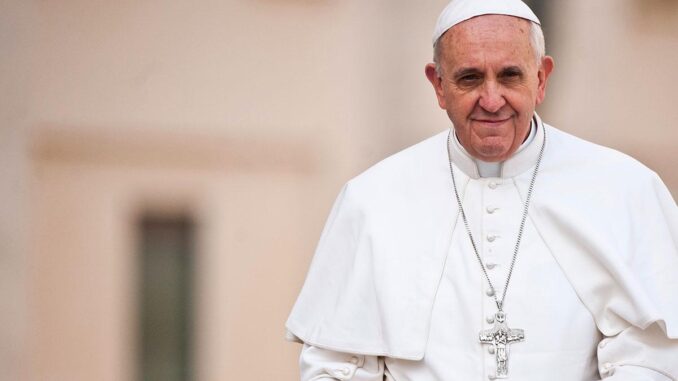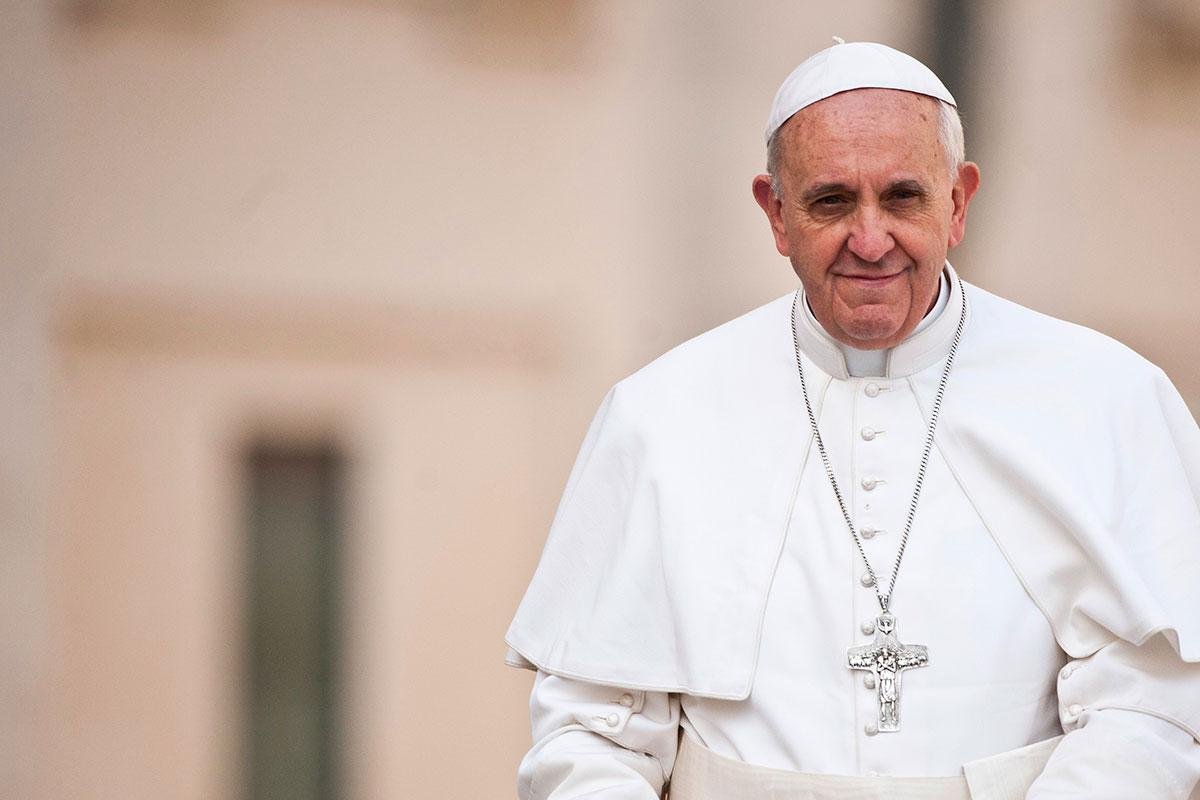
The biography of Pope Francis begins with a humble Argentine boy named Jorge Mario Bergoglio, who would grow up to become one of the most influential and transformative leaders in the modern history of the Catholic Church. Born on December 17, 1936, in Buenos Aires, Pope Francis rose from humble beginnings to become the first Jesuit pope, the first pope from the Americas, and the first non-European to hold the papacy in over 1,200 years. His election in 2013 marked a turning point for the Vatican, ushering in an era of humility, social justice, environmental advocacy, and progressive dialogue both within and beyond religious circles.

Photo Credit: Catholic Bishops’ Conference
This comprehensive biography explores the deeply personal and spiritual journey of Pope Francis—from his early years in Argentina and his religious formation in the Society of Jesus to his pastoral mission among the poor and his groundbreaking leadership as the 266th Pope of the Roman Catholic Church. Through his teachings, writings, and global outreach, Pope Francis has challenged traditional norms and emphasised the Church’s responsibility to the marginalised and the environment. His legacy continues to shape conversations around faith, morality, and global solidarity in the 21st century.
Read Also: How Did Pope Francis Pass Away: Date of Death and Legacy
Contents
- 1 Biography of Pope Francis: Early Life and Family Background
- 2 Religious Calling and Formation
- 3 Rise Within the Church
- 4 Cardinal Jorge Bergoglio
- 5 Papal Priorities and Teachings
- 6 Views on Social and Global Issues
- 7 Major Pastoral Visits and Global Impact
- 8 Reforms and Challenges
- 9 Personal Traits and Leadership Style
- 10 Legacy and Influence
- 11 Awards and Recognitions
- 12 Writings and Publications
- 13 Fun Facts and Personal Interests
- 14 Criticism and Controversies
- 15 Quotes and Sayings of Pope Francis
- 16 Conclusion
- 17 Frequently Asked Questions (FAQs)
Biography of Pope Francis: Early Life and Family Background
Jorge Mario Bergoglio was born on December 17, 1936, in Flores, a neighbourhood of Buenos Aires, Argentina. He is the eldest of five children born to Italian immigrants Mario José Bergoglio, a railway worker, and Regina María Sívori, a homemaker. Raised in a devout Roman Catholic household, young Jorge grew up valuing hard work, faith, and community. As a student, he demonstrated early interests in literature, philosophy, and chemistry, even briefly working as a chemical technician. He also enjoyed soccer and was an avid supporter of the San Lorenzo football club.
Religious Calling and Formation
Bergoglio felt a deep spiritual calling in his early twenties. In 1958, he entered the Society of Jesus, also known as the Jesuits—a Roman Catholic order known for its intellectual rigour and dedication to education, social justice, and missionary work. His formation included studying humanities, philosophy, and theology in Argentina and abroad. He was ordained a priest in 1969 and took his final vows as a Jesuit in 1973. The principles of Ignatian spirituality, which emphasise discernment, humility, and serving others, profoundly influenced his worldview and pastoral style.
Rise Within the Church
Bergoglio quickly rose through the ranks of the Jesuits, becoming Provincial Superior of the Jesuits in Argentina from 1973 to 1979. During this time, Argentina faced a brutal military dictatorship, and Bergoglio’s role was complex and often scrutinised. He later served in teaching and administrative roles at theological institutions. In 1992, he was appointed auxiliary bishop of Buenos Aires, and by 1998, he became the Archbishop. Pope John Paul II elevated him to Cardinal in 2001. As Archbishop, he was known for his austere lifestyle and deep commitment to the poor.
Cardinal Jorge Bergoglio
As Cardinal, Bergoglio solidified his reputation as a man of the people. He declined luxurious accommodations and chose to live in a simple apartment. He cooked his meals and used public transportation. He was an outspoken advocate for the poor and marginalised, emphasising pastoral care over doctrinal rigidity. He participated in multiple Vatican synods, contributing to discussions on Church doctrine and reform. During the 2005 conclave, following the death of Pope John Paul II, he was reportedly the second-highest vote-getter, behind Cardinal Joseph Ratzinger, who became Pope Benedict XVI.
Read Also: When was Pope Francis elected? Wife, Daughter, Net Worth & More
After Pope Benedict XVI’s unexpected resignation in February 2013, Bergoglio was elected Pope on March 13, 2013. His election was historic—he became the first Jesuit pope, the first from the Americas, and the first non-European Pope in over 1,200 years. He chose the name Francis in honour of Saint Francis of Assisi, symbolising a papacy focused on humility, peace, and care for creation. His first appearance on the balcony of St. Peter’s Basilica, dressed and asking the crowd to pray for him, set the tone for a transformative papacy.
Papal Priorities and Teachings
Pope Francis has prioritised compassion, mercy, and inclusivity. His key encyclicals include:
- Evangelii Gaudium (2013) – Emphasises the joy of the Gospel and the importance of evangelisation.
- Laudato Si’ (2015) – Addresses environmental issues and the moral responsibility to protect the planet.
- Fratelli Tutti (2020) – Advocates for global fraternity, peace, and social justice. He has also advocated for reforms in Vatican governance, financial transparency, and the decentralisation of the Curia. His leadership reflects a pastoral, rather than bureaucratic, approach.
Views on Social and Global Issues
Pope Francis has spoken boldly on many global issues:
- Poverty and Inequality: Advocates for economic systems that serve the common good.
- Migration and Refugees: Urges nations to welcome and support displaced people.
- Climate Change: Highlights the environmental crisis as a moral issue.
- Peacebuilding: Encourages dialogue and diplomacy to resolve conflicts.
- Interfaith Relations: Promotes respect and collaboration between religions.
- LGBTQ+ Inclusion: While upholding Church doctrine, he emphasises dignity and pastoral care for all.
- Capitalism Critique: Warns against unchecked capitalism and consumerism.
Major Pastoral Visits and Global Impact
Pope Francis has made numerous influential trips:
- Brazil (2013): World Youth Day.
- USA (2015): Addressed Congress and the UN.
- Philippines (2015): Show of solidarity with typhoon victims.
- Iraq (2021): Promoted interfaith harmony.
- Africa: Highlighted poverty and social justice. He has made historic gestures, including meeting Orthodox Patriarch Kirill and visiting the Arabian Peninsula, underscoring his commitment to unity and peace.
Reforms and Challenges
Francis has pursued major reforms:
- Restructuring the Roman Curia for efficiency and transparency.
- Overhauling the Vatican Bank to eliminate corruption.
- Responding to the sexual abuse crisis with new accountability measures. He has faced criticism, especially from conservative groups, for his perceived leniency and reformist stance. Balancing tradition and progress remains a central challenge.
Personal Traits and Leadership Style
Francis is known for his warmth, simplicity, and accessibility. He lives in a modest guesthouse (Casa Santa Marta) rather than the Apostolic Palace. He emphasises listening, compassion, and spiritual discernment. His use of Twitter and other social media platforms has enabled him to connect with people worldwide. He champions a “Church that is poor and for the poor.”
Legacy and Influence
Pope Francis has redefined the papacy in modern terms:
- Emphasising pastoral care over dogmatic control.
- Revitalising global interest in Catholicism.
- Influencing global policy debates on environment and equity.
- Inspiring younger generations and those previously alienated from the Church. His legacy lies in building a more inclusive, compassionate Church rooted in service.
Awards and Recognitions
- TIME Person of the Year (2013).
- Named among the world’s most influential people by Forbes, Fortune, and others.
- Received honorary doctorates and peace awards.
- Recognised by interfaith and humanitarian organisations.
Writings and Publications
Pope Francis’s writings include:
- Encyclicals: Evangelii Gaudium, Laudato Si’, Fratelli Tutti.
- Books: The Name of God is Mercy, Let Us Dream, On Heaven and Earth.
- Homilies and Interviews: Widely quoted for his relatable, thoughtful messages.
Fun Facts and Personal Interests
- A passionate soccer fan supports San Lorenzo FC.
- Speaks multiple languages: Spanish, Italian, German, and Latin.
- Enjoys tango music and traditional Argentine dishes.
- Known for his love of coffee and humour.
- Prefers handwritten notes and spontaneous speeches.
Criticism and Controversies
- Some critics argue he’s too progressive.
- Others claim he hasn’t gone far enough in reforming responses to abuse.
- Traditionalists express concern over doctrinal ambiguity.
- Political leaders sometimes bristle at his critiques of capitalism and nationalism.
Quotes and Sayings of Pope Francis
- “Who am I to judge?”
- “A little bit of mercy makes the world less cold.”
- “Money must serve, not rule.”
- “We are all brothers and sisters.”
- “The Earth is our common home.” These quotes reflect his deep moral convictions and humanistic outlook.
Conclusion
Pope Francis’s journey from the streets of Buenos Aires to the Vatican throne reflects a life of service, humility, and vision. In a time of global uncertainty, he offers a message of hope, compassion, and unity. Whether through his writings, actions, or reforms, his influence extends far beyond the Catholic Church, touching lives across religious and national boundaries. As he continues to shape the Church’s role in the modern world, Pope Francis stands as a powerful symbol of faith in action.
Frequently Asked Questions (FAQs)
- What is Pope Francis’s real name? Jorge Mario Bergoglio.
- How old is Pope Francis? Born in 1936, he is currently 88 years old.
- Why did he choose the name Francis? To honour Saint Francis of Assisi, symbolising humility and care for the poor.
- What are Pope Francis’s main teachings? Mercy, inclusion, environmental care, and social justice.
- Is he considered a liberal or conservative pope? He defies simple labels but is widely seen as progressive.
- What makes Pope Francis different from other popes? His Jesuit background, focus on humility, and bold stances on global issues.
Shehu Suleiman Kayode is a decent SEO writer, poet and opinion writer on national happenings. His opinions have featured in some Nigerian National Dailies, including The Nation, PUNCH, The Ravens, and others.

Leave a Reply